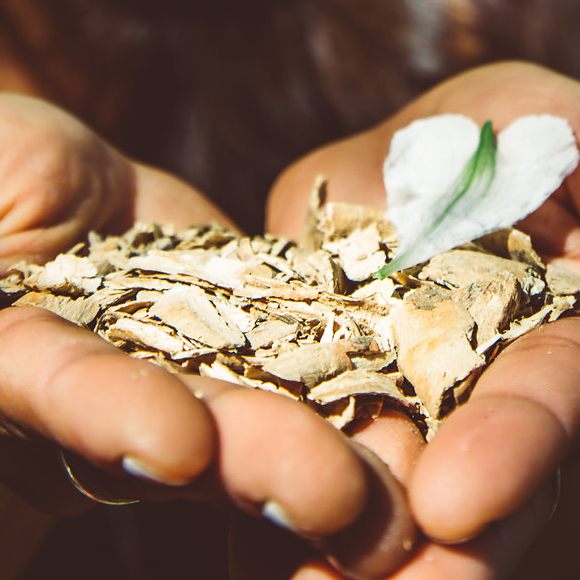Tabernanthe iboga sprouts green leaves, bears small fruit, and carries within its roots the core of Gabon’s Bwiti culture: one of the strongest psychedelic compounds in the world.
In its powdered form, the dried peelings of the iboga root resemble instant coffee. A small dose works like coffee, too. Bwiti hunters occasionally use it as a stimulant. Healers also employ moderate doses to treat a host of physical maladies. But a larger dose serves the ritual purpose of initiating newcomers into the Bwiti religion.
The person undergoing initiation enters a Bwiti temple, where they’re covered in powdered clay. They consume iboga—either in dried chips, spoonfuls of powder, or (less commonly) mixed with tea. Daniel Pinchbeck, whose book Breaking Open the Head takes its title from the way the Bwiti describe the ceremony, consumed iboga via a plantain that had been sliced open and filled with powder, as well as spoonfuls of powder mixed with honey. He describes the taste as “like sawdust laced with battery acid.”
For the rest of the night—and sometimes for several days—those participating in the ceremony remain under the care of other Bwiti. Why the need for company? Because the active alkaloid in the plant, ibogaine, causes out-of-body, hallucinatory experiences. The Bwiti use these visions to connect with ancestors.
Unfortunately, some turn to the powerful psychedelic plant for a wild drug trip instead of a spiritual journey. Much like the case with South America’s psychedelic ayahuasca plant, foreigners travel from all over the world to experience iboga’s effects—just because they can. Traditional Bwiti practitioners are concerned by the diminishing and commodification of their sacred rituals.
However, one Western did find a new helpful use for the plant: In 1962, an addict in New York City tried ibogaine, found he no longer desired heroin, and dedicated his life to advocating for ibogaine as a cure for addiction. More research is needed, but many addicts swear by iboga’s ability to prevent opiate withdrawal. Ibogaine is available from rehab clinics wherever it is legal, including Canada, Mexico, and Europe.
Despite its disparate uses across religious, recreational, and medicinal arenas, one thing remains consistent: iboga’s power is undeniable.
Written By
 rachelrummel
rachelrummel
Sources
- www.slate.com/articles/news_and_politics/roads/2016/12/gabon_tourists_want_to_try_one_of_the_world_s_strongest_psychedelic_drugs.html
- www.theatlantic.com/health/archive/2016/07/a-psychedelic-can-cure-heroin-withdrawal/492872/
- erowid.org/chemicals/ibogaine/ibogaine_timeline.php
- iceers.org/travel-to-gabon.php#.WhQleUtrxMF
- www.theatlantic.com/health/archive/2016/07/a-psychedelic-can-cure-heroin-withdrawal/492872/
- www.salon.com/1999/11/03/iboga/












